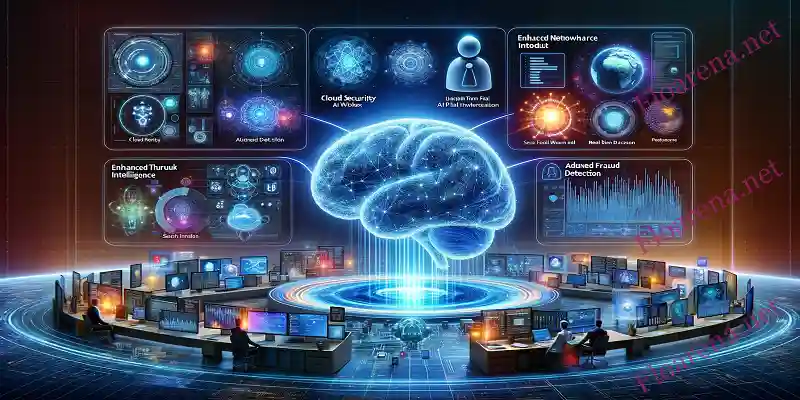Cyber attacks grow stronger each day. Old security methods cannot stop new threats. Companies lose millions from data breaches. Smart technology helps solve this problem.
Artificial Intelligence (AI) in Cybersecurity uses computer programs that think and learn. These programs protect networks better than old tools. They work day and night without breaks.
Hackers use new tricks constantly. Security teams cannot catch every attack manually. Smart systems spot dangers humans might miss.
What Makes Cybersecurity Smart

Core Components of Smart Security
Artificial Intelligence (AI) in Cybersecurity includes several parts:
- Learning Programs: Software that gets better over time
- Pattern Spotters: Tools that find unusual activities
- Auto-Response Systems: Programs that fight threats instantly
- Data Readers: Software that understands network information
- Behavior Watchers: Tools that track user actions
How Smart Security Works
Smart security follows these steps:
- Information Gathering: Collects data from all network points
- Pattern Checking: Compares current activity to normal patterns
- Danger Rating: Decides how serious each threat might be
- Warning Creation: Sends alerts about possible attacks
- Quick Action: Blocks bad activities right away
Smart systems never sleep. They watch everything all the time. This constant watching helps catch problems early.
Main Uses of Smart Cybersecurity

Fighting Bad Software
Artificial Intelligence (AI) in Cybersecurity stops harmful programs:
- Known Threat Detection: Finds viruses security teams already know about
- New Threat Spotting: Catches unknown dangerous software
- Behavior Tracking: Watches how programs act on computers
- File Checking: Scans documents and files for hidden dangers
- Real-Time Protection: Blocks threats as they appear
Email Protection Systems
Email attacks target many companies. Smart security helps by:
- Link Safety Checking: Tests website links before users click them
- Message Reading: Examines email content for danger signs
- Sender Testing: Checks if emails come from real people
- File Scanning: Looks inside email attachments for threats
- Trick Detection: Spots attempts to fool employees
Network Safety Tools
Artificial Intelligence (AI) in Cybersecurity guards company networks:
- Strange Activity Spotting: Notices when network behavior changes
- Traffic Watching: Monitors all data moving through systems
- Intruder Blocking: Stops unauthorized people from entering networks
- Movement Tracking: Follows attackers as they move between computers
- Command Finding: Discovers hidden communication with hackers
User Identity Management
Smart systems verify who uses company resources:
- Body Feature Checking: Uses fingerprints and face recognition
- Typing Pattern Learning: Remembers how each person types
- Risk-Based Access: Adjusts security based on danger levels
- Special Account Watching: Monitors users with high access rights
- Account Theft Prevention: Stops unauthorized account usage
Benefits of Using Smart Security
Faster Threat Finding
Speed matters in cybersecurity. Smart systems provide:
- Instant Checking: Reviews threats in seconds not hours
- Quick Responses: Reacts faster than human security teams
- Always-On Protection: Never stops working or takes breaks
- Multiple Task Handling: Checks many threats at the same time
- Future Prediction: Guesses what attacks might come next
Better Accuracy in Threat Detection
Old security tools create too many false alarms. Artificial Intelligence (AI) in Cybersecurity fixes this:
- Smart Filtering: Tells real threats from normal computer use
- Situation Understanding: Considers what is happening around each event
- Improvement Over Time: Gets better at spotting real dangers
- Event Connecting: Links related security incidents together
- Priority Setting: Ranks threats by how dangerous they are
Money-Saving Security Operations
Smart security helps companies spend less while staying safer:
- Automatic Work: Reduces need for human monitoring
- Better Resource Use: Focuses attention on real threats only
- Growing Protection: One system can protect many company assets
- Less Downtime: Faster responses mean less business interruption
- Lower Training Costs: Systems need less human expertise to run
Growing with Your Business
Artificial Intelligence (AI) in Cybersecurity adapts as companies change:
- Learning New Threats: Adjusts to handle different types of attacks
- Flexible Setup: Works in different computer environments
- Cloud Support: Expands with cloud-based business systems
- Multi-System Coverage: Protects various types of computers
- Future-Ready Technology: Evolves as new threats appear
Current Trends in Smart Cybersecurity
Advanced Security Helpers
Modern security includes helpful tools:
- Security Chat Programs: Answer questions about threats instantly
- Report Writers: Create detailed security summaries automatically
- Information Processors: Handle large amounts of security data quickly
- Code Checkers: Review software for security problems
- Response Planners: Suggest actions when attacks happen
Zero Trust Security Models
Artificial Intelligence (AI) in Cybersecurity supports never-trust approaches:
- Constant Checking: Always verifies user identities
- Network Splitting: Creates separate security zones
- Dynamic Rules: Changes security policies based on current situations
- Device Scoring: Rates how trustworthy each computer is
- Context Access: Considers many factors before allowing system access
Cloud Security Improvements
Smart security makes cloud computing safer:
- Multi-Cloud Watching: Monitors different cloud service providers
- Container Protection: Secures modern application packages
- Function Monitoring: Watches cloud-based program functions
- Settings Management: Ensures cloud configurations stay secure
- Data Protection: Prevents sensitive information from being stolen
Challenges in Smart Cybersecurity
Technical Problems
Artificial Intelligence (AI) in Cybersecurity faces several obstacles:
- Data Quality Needs: Requires clean and accurate information to work well
- Complex Setup: Building effective systems needs special skills
- Computer Power Requirements: Needs powerful computers to run properly
- Integration Issues: Connecting with existing tools can be difficult
- Maintenance Needs: Systems require regular updates and fixes
Security Risks with Smart Systems
Smart security systems can become targets themselves:
- Attack Attempts: Hackers try to fool smart security systems
- Training Corruption: Bad data can damage system learning
- Privacy Problems: Systems might expose sensitive company information
- Unfair Decisions: Systems might make biased security choices
- Over-Dependence: Relying too much on automation creates new risks
Human Factors
Artificial Intelligence (AI) in Cybersecurity works best with human help:
- Skills Gap: Companies need trained security professionals
- Trust Building: Teams must learn to work with smart systems
- Decision Clarity: System choices are not always easy to understand
- Responsibility Issues: Someone must be accountable for system decisions
- Change Management: Companies must adjust work processes for smart tools
How to Start Using Smart Security
Planning Phase
Before starting Artificial Intelligence (AI) in Cybersecurity projects:
- Check Current Security: Understand what protection already exists
- Find Best Uses: Determine where smart tools help most
- Set Clear Goals: Define specific objectives for smart security
- Plan Budget: Allocate money for tools and training
- Create Timeline: Make realistic schedules for implementation
Choosing the Right Tools
Selecting smart security solutions involves:
- Compare Vendors: Look at different smart security companies
- Test Solutions: Try tools in safe environments first
- Check Compatibility: Ensure new tools work with existing systems
- Plan for Growth: Choose solutions that can expand with business needs
- Evaluate Support: Make sure vendors provide good help and training
Best Deployment Practices
Successful Artificial Intelligence (AI) in Cybersecurity setup requires:
- Step-by-Step Installation: Add smart tools gradually across the company
- Data Preparation: Ensure high-quality information for system learning
- Staff Training: Teach employees how to work with smart systems
- Performance Monitoring: Watch how well systems work over time
- Process Updates: Change procedures to include smart capabilities
Future of Smart Cybersecurity
New Technologies Coming
The future brings exciting developments for Artificial Intelligence (AI) in Cybersecurity:
- Quantum-Safe Security: Protection against super-powerful future computers
- Clear Decision Making: Better understanding of why systems make choices
- Self-Managing Security: Systems that run themselves with minimal help
- Proactive Hunting: Tools that look for threats before they cause damage
- Shared Intelligence: Systems that share threat information automatically
Market Growth Expectations
Industry experts predict strong growth:
- More Investment: Companies will spend more on smart security
- Better Technology: Tools will become more advanced and reliable
- New Rules: Governments may require smart security measures
- Skill Growth: More professionals will learn smart security skills
- Innovation Speed: Faster development of new security features
Preparing for Tomorrow
Artificial Intelligence (AI) in Cybersecurity will evolve to handle:
- Smart Attacks: Defending against intelligent malicious programs
- Device Security: Protecting billions of connected everyday items
- Supply Chain Protection: Securing complex technology partnerships
- Government Attacks: Defending against sophisticated nation-level threats
- Privacy Balance: Maintaining security while respecting personal privacy
Industries Using Smart Security Most
Banking and Finance
Financial companies lead smart security adoption because:
- Valuable Targets: Money and financial data attract criminals
- Strict Rules: Laws require strong security measures
- Customer Trust: Security problems damage reputation badly
- Instant Transactions: Smart systems enable immediate fraud detection
- Global Business: Smart tools work across international boundaries
Healthcare Systems
Medical organizations use Artificial Intelligence (AI) in Cybersecurity for:
- Patient Privacy: Protecting sensitive medical records
- Equipment Security: Securing connected medical devices
- Rule Compliance: Meeting healthcare privacy requirements
- Attack Prevention: Protecting against hospital shutdowns
- Research Protection: Safeguarding valuable medical discoveries
Government Offices
Public organizations focus on:
- National Protection: Securing critical infrastructure systems
- Citizen Data: Protecting government databases and records
- Warfare Defense: Defending against nation-level cyber attacks
- Secret Information: Protecting sensitive security intelligence
- Service Continuity: Keeping government services running smoothly
Smart Security Best Practices
Data Management Excellence
Effective Artificial Intelligence (AI) in Cybersecurity needs proper data handling:
- Quality Control: Maintain clean and accurate security information
- Privacy Protection: Hide sensitive details appropriately
- Lifecycle Management: Properly store and dispose of security data
- Access Limits: Control who can see security-related information
- Backup Plans: Ensure systems can recover from failures
Continuous Improvement
Organizations should regularly enhance smart security:
- Performance Checking: Regularly test how well systems work
- System Updates: Keep programs current with latest threats
- Team Feedback: Use security staff input to improve systems
- Threat Updates: Feed new threat information into smart systems
- Regular Audits: Verify systems meet security standards
Working Together
Artificial Intelligence (AI) in Cybersecurity benefits from cooperation:
- Industry Sharing: Exchange threat information with other companies
- Vendor Partnership: Work closely with smart security providers
- Research Help: Contribute to cybersecurity research projects
- Standards Creation: Help develop smart security best practices
- Community Participation: Join cybersecurity forums and groups
Measuring Smart Security Success
Important Numbers to Track
Organizations should monitor specific results:
- Threat Finding Rate: Percentage of real threats discovered
- False Alarm Reduction: Decrease in incorrect threat warnings
- Response Speed: How quickly systems react to dangers
- Money Saved: Reduction in security operation costs
- Attack Prevention: Number of successful attacks stopped
Return on Investment
Measuring Artificial Intelligence (AI) in Cybersecurity value involves:
- Setup Costs: Total expenses for smart security deployment
- Savings: Reduced manual security monitoring expenses
- Attack Prevention Value: Cost of damages that were prevented
- Rule Benefits: Reduced risk of regulatory penalties
- Business Protection: Value of prevented business interruptions
Long-Term Success Factors
Lasting smart security success requires:
- Leadership Support: Management commitment to smart security projects
- Staff Growth: Ongoing training for security team members
- Technology Updates: Keeping pace with advancing capabilities
- Everyone Involved: Including all relevant people in security planning
- Business Alignment: Ensuring smart security supports company goals
Getting Started Today
First Steps for Companies
Companies ready to begin should:
- Assess Current State: Understand existing security strengths and gaps
- Start Small: Begin with one area before expanding
- Build Skills: Train current staff on smart security concepts
- Choose Partners: Find reliable vendors and consultants
- Measure Progress: Track improvements from smart security investments
Common Mistakes to Avoid
Organizations should watch out for:
- Moving Too Fast: Implementing everything at once creates problems
- Ignoring Staff: Not involving security teams in planning decisions
- Skipping Training: Failing to prepare employees for new tools
- Poor Data Quality: Using bad information to train smart systems
- Unrealistic Expectations: Expecting perfect results immediately
Conclusion
Artificial Intelligence (AI) in Cybersecurity offers the best protection for modern businesses against evolving cyber threats. Smart security systems detect threats faster, reduce false alarms, and save costs while adapting to new attacks. Success requires proper planning, gradual implementation, and staff training. Companies embracing smart security today gain competitive advantages in threat prevention, cost savings, and customer protection over traditional security methods.






